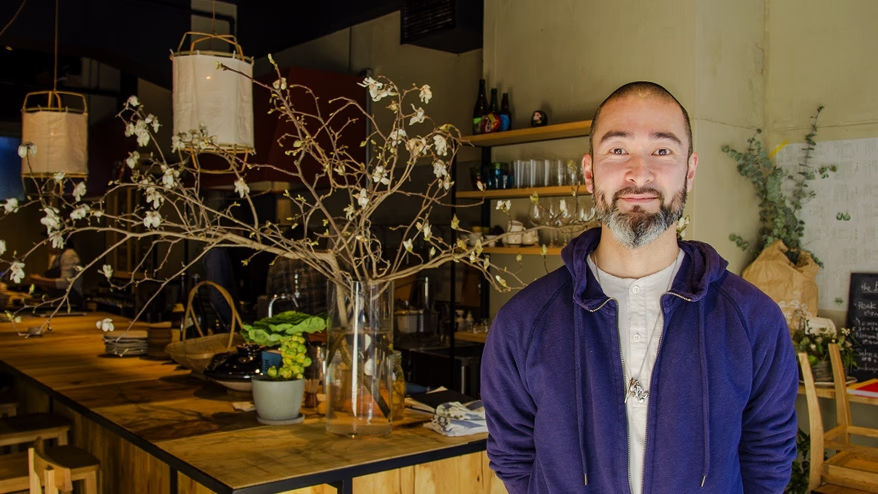Appearing on this edition of Meguru Measuring Ruler is Shinichiro Harakawa.
In his mid-20s, while working in a job completely unrelated to food, he decided that "I want to create a place where people can gather someday," and began training at "Concombre" in Shibuya. He then traveled to France and worked at the two-star restaurant "La Madeleine" for a year. In 2012, at the age of 34, he opened his own restaurant, "BEARD," in Meguro.
Manabe, head of the production department and manager of the Food Hub Project , frequented BEARD in anticipation of the dishes prepared by Harakawa.
However, the relationship between the two goes beyond that of owner-chef and customer.
They met at a food event, which both of them look back on as having changed their lives.
That was one year before Harakawa opened his shop.
Staff from Chez Panisse , a California organic restaurant that has been cultivating a culture and community of local production and consumption since the 1970s, were invited to Japan for the event "OPENharvest," where they cooked and served food like an installation.
Manabe will be in charge of directing the event on the day, working behind the scenes as an interpreter and attendant for the chefs and staff who come to Japan, while Harakawa will be participating in "OPENharvest" as one of the chefs creating the food.
The connections he made there led him to found RichSoil&Co. with Jerome Waag, former executive chef of Chez Panisse. After closing BEARD, he opened a new restaurant, the Blind Donkey , in Kanda, Tokyo in December 2017.
Manabe sat down at the counter of "the Blind Donkey" to talk to Harakawa about his past and future plans, as well as his thoughts on food. As expected, the conversation between the two of them expanded in a grand way, and we will deliver it to you in two parts.
(Interviewer: Kensaku Saguchi)
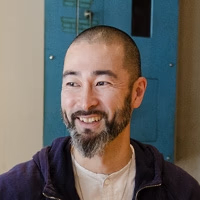
Profile of Shinichiro Harakawa :
Co-representative of RichSoil & Co. After working at a bistro in Tokyo, he traveled to France in 2008 and trained at the two-star restaurant La Madeleine. After returning to Japan, he worked as a chef at the natural wine cafe Uguisu in Sangenjaya, and in 2012 opened the travel-themed restaurant BEARD. At the end of last year, he started the restaurant the Blind Donkey with Jerome Waag, former executive chef of the organic restaurant Chez Panisse in California, with the aim of making Japan 100% organic. Jerome collects ingredients from producers around the country and uses his skills to provide seasonal flavors.
The shock of "OPENharvest" - Is it really okay to have something so simple? But so delicious!
- First of all, can you tell us about "OPENharvest" , how you two met?
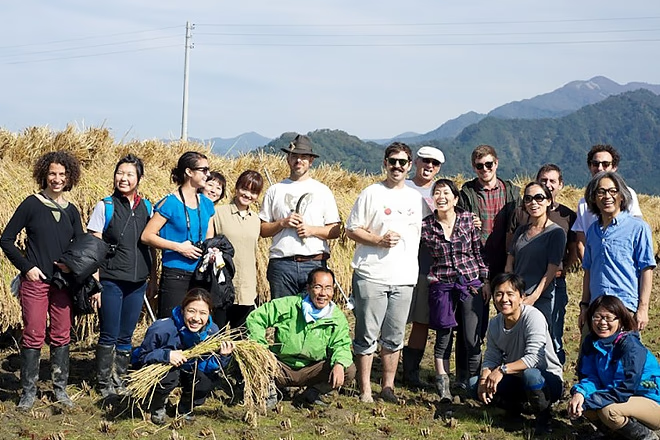
※ OPENharvest
( http://foodlight-project.blogspot.jp/ )
Food director and restaurant eatrip owner Nomura Yuri invited staff from Chez Panisse to Japan to host a participatory food and art event. The main theme was connecting producers and consumers. It later developed into the Nomadic Kitchen project, in which both Harakawa and Manabe also participated.
Manabe
Personally, I feel like my life has completely changed since "OPENharvest."
Mr. Harakawa, I feel the same way.
Manabe: Is it the same?
Yes, Mr. Harakawa . I think it was fate. I didn't end up helping out with the core parts, but there were a lot of things that surprised me. It was just when I had just come back from a year at "La Madeleine" in France, and I only had experience in a traditional kitchen in France.
A chef must "serve high-quality food quickly" under tension and stress. I also thought that high-quality food could only be produced if I put pressure on myself.
While I was helping out at OPENharvest, the chefs all gathered together and said, "Yay," and "What should we do with this," in a friendly atmosphere, and then we cut a pumpkin in half and popped it in the oven (laughs).
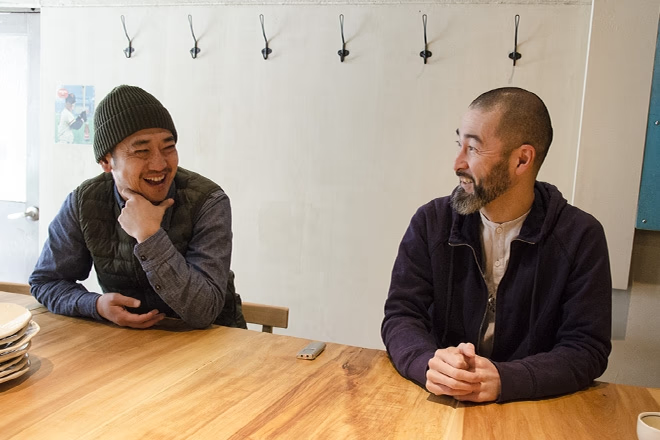
Manabe
Hahaha. What dish from that time do you remember most, Shin-chan?
Harakawa
Charlie's pumpkin dish. Eh? Is this a dish? Is it okay to make something so haphazard? I thought, but it was actually delicious when it was done.
At the time I thought I had to add various things to ingredients to make them look cool, so it was shocking and cool to me.
OPENharvest from JTQ Inc on Vimeo .
Manabe :I see.
Mr. Harakawa: Charlie, who made the pumpkin dish, said so, and Jerome, who I'm currently working with on "The Blind Donkey," always says that chefs should "not put their ego on the dish." Of course, different people will have different personalities when they cook, but you can't put your ego on it. It's like the right amount of salt, and I learned that it's no good to put too much of your personality into it, and it's no good to put too little.
So I wanted to go and visit the store where they work.
Manabe : "Chez Panisse"?
Harakawa went to "Chez Panisse".
The vegetables you eat with your hands are so delicious! My experience at Chez Panisse in California
Manabe: Did you actually go right away?
Harakawa-san went there right away. When I was working on "OPENharvest," I got Jerome's email address and contacted him. He replied, "I'd be happy to help out as an intern over the summer," so I said, "Okay, I'll go over the summer."
However, I was preparing to open "BEARD" that year. Construction started in May and we opened in July, but I had promised Jerome to open in August, so we opened for two weeks and then closed down.
Soon after the Manabe debut, they closed down. I don't understand why (laughs).
Harakawa
That's right (laughs).
But I thought to myself that I absolutely had to go, for my own sake.
However, at that time, I didn't really understand Chez Panisse's farm-to-table approach and commitment to local production and consumption. I knew they were doing it, but I didn't really understand what it meant.
Manabe: Actually, that's true.
Harakawa: When I was helping out, the vegetables I picked up and ate were so delicious. I thought, "What is this?" I thought, "This is something special." The local culture of local production and consumption all started with "Chez Panisse," and it's firmly rooted there. I don't think there's anywhere else like it.
Manabe : That's right. How do we get to the point where the culture takes root? It may seem like a bit of a conclusion, but that's a question that comes up in our minds. It applies to what we're doing now too.
Harakawa: It seems that interest is gradually increasing in Japan, but each is scattered and has not yet become a big "movement" that connects all at once like the California counterculture. That may be because Japanese people are artisan-type people. Farmers, engineers, chefs, each of them tend to be isolated, pursuing their own interests, and don't have much interaction with the outside world.
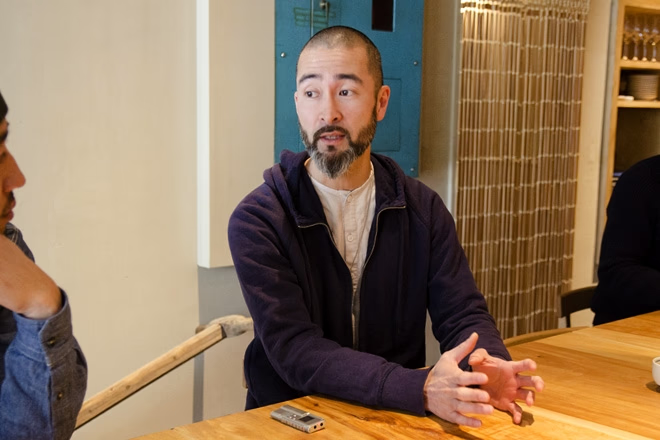
Manabe
Farmers are especially prone to this, because as they go about their daily routine, they develop a deeper belief that what they are doing is right.
Harakawa
When I was talking with Jerome, we agreed that this is what makes us different from Americans and people from other countries.
Perhaps it's difficult to think along the lines of, "I have this style," "You have that style," "But ultimately we're looking in the same direction," or "Well, let's work together and help each other out."
I also think there is the problem of being too busy. Everyone is so busy, they are overwhelmed with their own responsibilities, and even if they meet stimulating or attractive people, they cannot be in constant contact with them unless they make time for themselves. This may not be limited to Japanese people, but if you don't have time, you can't be active.
How do you make time, Manabe Shin- chan? You're busy these days, aren't you?
Although Harakawa has given up on the idea since the store has only just opened, he is still feeling a bit uneasy (laughs).
Manabe : There are times when things take time.
There's no point in rushing, Harakawa-san .
Manabe: While understanding the current situation, do you feel like you are preparing for the next move?
Harakawa: That’s right. To make something take root, you have to build a foundation.
Manabe: Let's talk about this later.
What I want to create is a place where you can eat "really delicious food" as a matter of course.
Manabe : To go back to the topic a little, after "OPENharvest" you started " Nomadic Kitchen". Nomura Yuri and Shin-chan were the core group, and I was just supporting them. What kind of influence did that activity have on you?
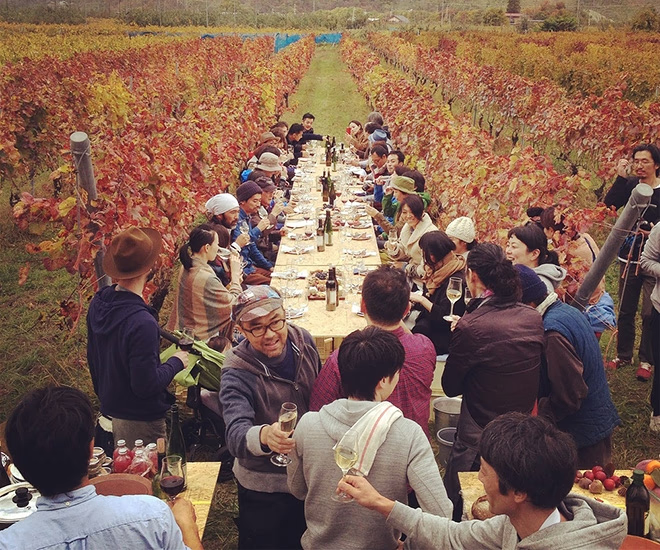
※ Nomadic Kitchen
( http://nomadic-kitchen.org/ )
Together with Yuri Nomura from "restaurant eatrip", Shunji Higashimori from "Cignale ENOTECA", and Rinpei Yoshikawa from "Pignon", they visit various places under the name "Nomadic Kitchen" and hold food events that make use of the local climate and culture. Manabe supports all activities as the manager.
Harakawa: I go to meet the producers. I go to the place where the food is made. And it's not just an event-like meeting and chat, where we say, "Nice to meet you. This is delicious, please send it to your store," but we cook on the spot, eat together, and that deepens our relationship.
I learned a lot from all of that. I'm sure that experience has led to what the Blind Donkey is today.
Manabe : As the organizer, I tried to make sure that the chefs didn't just go to the production areas, cook, and then leave. I built relationships with the local producers, and then proceeded with each event one by one.
In particular, looking at it from a distance, I think the trip to Shikoku that you went on with Jerome (a five-day trip from April 9th to 13th, 2014, where we visited ingredients and the people who make them in various places in the Setouchi and Kochi regions) must have been a big thing for you, Shin-chan.
Harakawa: Yes. When I went to "Chez Panisse," I was shocked by the delicious vegetables and fruits in California, and while I was researching why they were so delicious, I ended up going to farms. In California, Jerome took me to a farm run by a man named Bob, who told me about the soil and seeds, and from there I learned about organic and natural farming, and I studied and wondered, "What is that?"
By the time I joined "Nomadic Kitchen," I gradually began to feel dissatisfied with just opening a restaurant, having customers come, and making money to live on. If that was all I had, I probably wouldn't be running a restaurant now.
At that time, I had the chance to talk at length with Jerome on that trip, and we thought a lot about the fundamental aspects of eating.
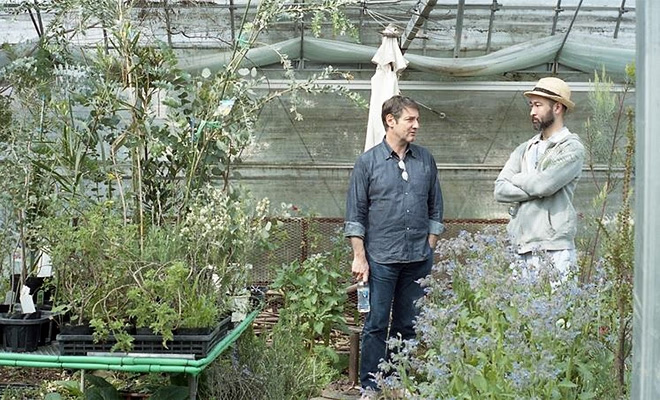
Jerome (left) and Harakawa talking during their trip to Shikoku
Manabe : It was a long time. I think we were together for about a week.
Harakawa
Yeah, that was a big experience.
I realized, "Oh, I don't want to open a restaurant." I had many questions that I had while touring the production areas, and I realized that I wanted to promote Japanese agriculture and the primary industry. By doing so, I hope to create an environment where people can eat really delicious food as a matter of course in their own neighborhood, even though I live in Tokyo now.
I began to think about what I could do to achieve this.
Manabe
This might be a bit off topic, but there's been talk of "I don't want to open a restaurant," and I'm one of those people, but I'm sure there are fans of the cooking of Shin-chan, the owner chef of "BEARD" (laughs).
But in "The Blind Donkey," Jerome is the chef and Shin-chan plays a supporting role. Does he really think of himself as no longer a chef? There's a sense of sadness in that.
Harakawa
When I look at my co-workers at "Nomadic Kitchen," Dad (Higashimori Shunji), Rinpei-kun (Yoshikawa Rinpei), and Jerome, I realize I'm not a chef after all.
ManabeWhat 's different?
Harakawa: All of those people love to cook (laughs). I don't really like it.
Manabe : Really? You don't like it that much? (laughs)
Harakawa
I have a sense of editing somewhere. If there is no one to cook, I will do it. I cook because I want to create a place to enjoy delicious food, to create a place where people gather around food. If I don't have to, I won't. I want to eat delicious food that someone else has made for me. That's why I think I'm an "eater." Crazy.
Manabe
Eater is a good word.
Harakawa-san and me. Because I love to eat a lot.
Manabe : If there's someone else who can make delicious food, then you don't have to do it?
Harakawa: That's right. Even when I cook, I think "making something that tastes good" comes first rather than "making something that I want to make." I just want to make something that tastes good in the given environment. So I don't really think "I want to make that."
Manabe : I see.
Harakawa: I guess that hasn't changed since I first started working in the food industry. It all started because I wanted to open a place where people could gather around food, a comfortable restaurant. To achieve that, I thought it would be better if I could cook myself.
I left my job because I wanted to open my own restaurant someday.
At 27 years old, he started out washing dishes at a small local store.
Manabe : First of all, what were you doing before you entered the culinary world?
Harakawa
Just before that, I worked in the copyright department of NHK, translating, handling broadcasting rights, and buying and selling. Before that, I worked for a travel agency in Canada, and returned to Japan during the Japan-Korea World Cup, and stayed in Kyoto for two years. I hadn't been in Tokyo for seven or eight years, so I didn't have any friends to hang out with after my NHK work was over (laughs). That's when I started eating around here and there, and that's how it all began.
It was just around the time that bistros started appearing in Tokyo, and French chefs and people from the cafe generation were opening restaurants where you could enjoy both food and drinks. I found it interesting and I started to think that one day I would like to open a restaurant myself.
I wanted to create a place where people could gather, play their favorite music, and create a new culture, not just a restaurant. I also loved eating, so I decided to quit my job because I thought it would be better to learn how to cook first.
Manabe, how old were you?
Harakawa
27 years old. Even if I wanted to create a place where many different people could gather, if there was no one who could make delicious food, the restaurant would not be attractive and people would not come. Even if I didn't end up being the one making the food, I still needed to know how to make it, so I started looking for a place where I could train while working, but no one would hire me (laughs).
I thought that if I learned in a hotel kitchen, I would have to carry herbs for a day. I'm 27 and I don't have that kind of time. I wanted to work in a small town shop.
But in small restaurants, if you're not an immediate asset, you're just a nuisance, so they said, "It's okay if you serve. It would be a problem if you came to the kitchen." After being turned down by many places, the restaurant that finally hired me was "Concombre" in Shibuya. It was so busy and tough that everyone quit soon after. I think I got the job because they were desperate for a helping hand.
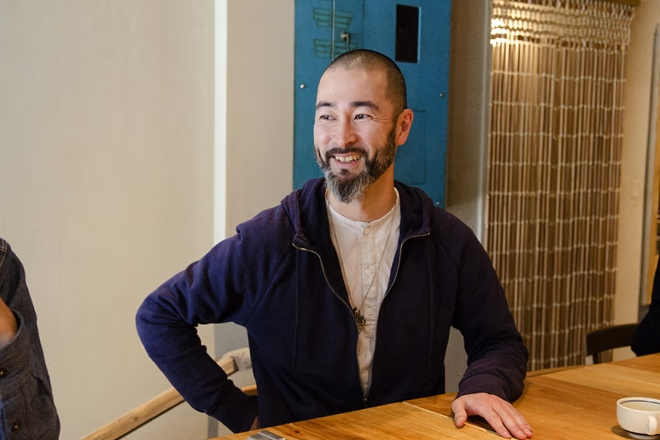
Manabe
How many years did you work there?
Harakawa
It's been about two and a half years since I started washing dishes.
Manabe
So then, when you were approaching 30, you went to France. How long did you stay there for?
Harakawa
A year after 2008, I came back in 2009. Through a friend, I worked as a chef at "La butte boisée" in Okusawa for a year, and at "uguisu" in Sangenjaya for about two and a half years. In 2012, I opened "BEARD". I left the company when I was 27, and at that time I had decided that I wanted to open a restaurant by the time I was 35. I was 34 when I opened "BEARD", so I was basically following my plan.
Manabe : It's amazing. But it's already been seven years since "OPENharvest." Time flies.
(To be continued in the second part )
